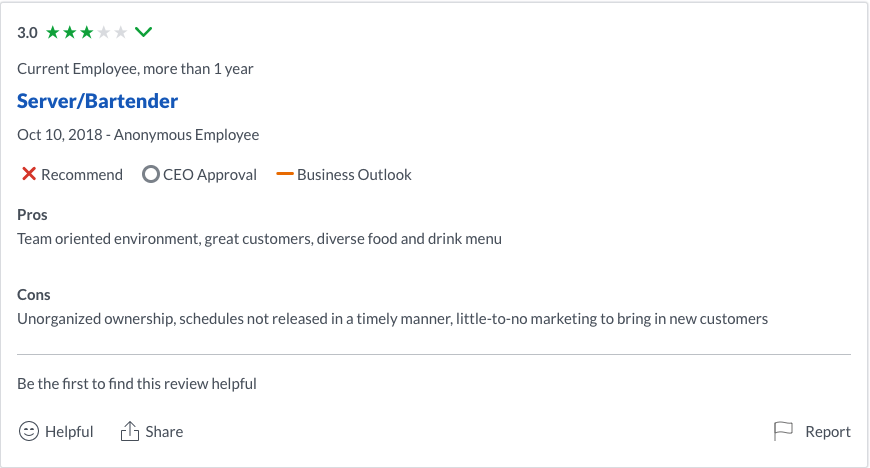Corporate Reputation Management for Enterprise Brands [2021 Guide]
In a world that thrives on living and working behind a screen, it is very important for companies of all sizes to work on their online reputation. […]
In a world that thrives on living and working behind a screen, it is very important for companies of all sizes to work on their online reputation. 94% of Americans have avoided certain businesses due to a negative online review. That means brands have an uphill climb ahead of them in gaining trust with their consumers.
This is where corporate reputation management comes in. Simply put, a brand’s corporate reputation is defined as the quality of your brand’s footprint and how it is consumed by your target audience.
Everything your brand does and says relates back to its reputation in multiple different ways. When looked at over time, a company’s reputation is the sum of how people, both internal and external stakeholders, feel about your brand as a whole.

It goes without saying that every brand needs to manage its online reputation, but many brands tend not to see their own weaknesses until it is too late. Working on your brand’s reputation sooner rather than later is extremely important for controlling how consumers view your brand both now and in the future, no matter where they come across it in the digital landscape.
Here is a guide on everything an enterprise brand needs to know about both improving and maintaining their corporate reputation for continued success.
What is Corporate Reputation Management?
Corporate reputation management is the process of monitoring and managing your online presence. A positive reputation can be the biggest asset to any business, but if not regulated correctly, it can be their biggest downfall.
It is important to note that business reputation management is targeted towards all the key stakeholders in your business’s success; from customers to investors and even your employees.

The logic behind this is simple: A good brand creates a great following, hires the best employees, and works hard to stand out in a sea of competition.
Why is Corporate Reputation Management Important?
Search engines are the primary way that users get information to make purchase decisions. This makes it essential to work on your brand reputation in as many digital spaces that you can.
Since our digital world makes it so easy for consumers to provide their unsolicited opinions on social media platforms and review websites, reputation management is a crucial business expense any business owner should invest in.
Here’s why:
- The impact of online reviews can make or break for a business; 90% of consumers will read a review before they even click on a website, and 73% say that they will trust a website even more after reading a positive review.
- 46% of companies have been damaged or are worried by negative press. This is up 29% from 2014 and represents the threat just one negative news article can do to a business.
- One-third of businesses report that negative content has already hurt their company, and these owners are worried about how this can affect their brand perception in the future.
What are Examples of Reputation Management?
Depending on your needs, there are a lot of different reputation management techniques that will remove bad news and unsightly press from your brand, while enhancing your influence in the online world. This can be done via:
- Crisis management
- Media relations
- Increasing positive reviews on multiple different review sites
- Creating and optimizing a new and improved website
- Developing blogs and thought leadership pieces that showcase your brand’s voice
- Distributing press releases
- Social media management of all your social networks, including Facebook, LinkedIn, Instagram, and more
Why Enterprise Brands Need a Corporate Reputation Management Strategy

As with any other digital marketing technique, your brand will need to put a comprehensive strategy behind your corporate reputation management output.
When you have a clear, defined strategy in place, you will be able to appeal to a whole group of stakeholders, while creating a competitive advantage for you. Not many brands have invested in reputation management, and a clear strategy will only work wonders in propelling your brand forward.
Here are some benefits to investing in a reputation management strategy.
- Increased sales. The bottom line is that when a consumer feels that they can trust the company they are working with, they will convert. They also might recommend your company to those in their network, which can lead to more sales. What’s there not to love about that?
- Enhanced customer loyalty. Customers who trust your reputation and have worked with you before will likely return to your services again in the future when needed.
- Attract top talent. Your reputation management strategy’s goal shouldn’t be just to create a strong reputation in the eyes of your consumers. Instead, you need to appeal to different stakeholders of all kinds, including potential employees. After all, your company wouldn’t be anything without them, and they deserve to work at a company they can be proud of.
- Improve your company’s market value. When you have all of the above, your brand reputation will become an intangible asset for your growth.
With these benefits in mind, why wouldn’t you invest in improving your corporate reputation as much as you can?
3 Example Failures of Corporate Reputation Management
In order to succeed at reputation management, you’ll want to look at examples of other enterprise brands that have had reputation management crises in the past. From bad reviews, to negative past actions, take a note of these brand’s failures when creating your own strategy.
1. United Airlines – Crossing Boundaries with Passengers
United Airlines has been dealing with negative stories about their brand since early 2017. Back in 2017, news of United denying two teenage girls from boarding an airplane quickly spread like wildfire over social media.
The airline agents reported that they didn’t allow the girls on the plane because their leggings were too sheer and inappropriate. Once consumers heard about this incident, they demanded an apology on behalf of the girls, but this never happened.
Instead, United’s social media team released a series of tweets where they defended the airline agent’s logic, and claiming that this was normal procedure for passengers.
But things just got worse a few weeks later, when a video went viral showing a bloody and bruised United passenger being dragged from a flight. Initially, United explained that this passenger had just gotten into a fight because the flight was overbooked, but it soon came out that his flight was given up to accommodate extra United Airlines employees.
The victim of the fight lost his two front teeth, suffered from a broken nose, and required facial reconstruction surgery. As a response, United’s CEO released a statement that again defended the actions of the gate agents, and said a lackluster apology to the passengers who witnessed the fight and needed to be re-accomodated.
The CEO’s statement didn’t do much for United’s reputation; within 24 hours of the incident, the United Airlines brand lost about $800 million in total value. Even though this happened 4 years ago, experts still say that this incident could call for irreparable brand damage to United as a whole.
2. Uber – A Temperamental CEO + Political Affiliations

Uber went from being one of the most celebrated brands in the world to one of the least in a matter of months. Starting in 2017, they experienced a whole host of reputation damaging events, such as:
- The CEO Travis Kalanick serving on an advisory council to then-President Donald Trump. Uber customers believed that any CEO should not make their political affiliations known in such a manner.
- Uber continued to serve JFK airport in New York City during a taxi strike against Donald Trump’s immigration policies. This caused a crisis internally with their employers who did not agree with this. And also with customers, as Uber surged prices as they were the only ride-share opportunity available.
- Ex-employees reporting on massive, wide-spread sexual harassment and HR misconduct all throughout the company.
- CEO Kalanick being captured on video arguing with an Uber driver over the sudden decrease in pay the company provided.
How did Uber respond to these indcidents? Not very well, in eyes of both their investors and their consumers.
The CEO has consistently made public apologies and have written letters to his employees and customers. But not many people were pacified. The general consensus is that when a senior executive like himself makes all these public statements, without much change, it is hard to believe the apologies.
Overall, this is a perfect example of how much your brand reputation matters.
Chipotle – Underplaying Health & Safety

Back in 2015, Burrito giant Chipotle experienced a wave of E-Coli outbreaks nationwide. As a result, the company experienced an 82% decrease in profit over a year. They also had a 15% dip in their stock’s value.
In the middle of the E-Coli outbreak, instead of mentioning how safe their food is to consume, a company leader made a public statement that denounced the Centers for Disease Control and basically implied that whenever someone sneezes, they now will believe Chipotle is the reason for them being sick.
This attempt at a joke was futile. It just went to further convince consumers that Chipotle was not taking their health and safety concerns seriously. Even though the company leader stepped down a year later, many consumers believe their response to the bacteria outbreak was not authentic and did little to quell health fears.
Best Practices of Corporate Online Reputation Management
Managing your brand’s image online isn’t always a simple thing. Depending on your needs, there are a lot of different techniques you can do to boost your corporate reputation. Here are some best practices of corporate online reputation management to add to your strategy.
Listen, Listen, Listen

Above anything else, you need to listen to the stakeholders in your business. This means your consumers, both returning and prospective customers, your investors, and your employees.
Every person that touches your company in any way needs to be heard. Make it a habit to listen to them as often as possible.
Host employee forums where employees can openly speak to senior management. Have a feedback option on your website for customers to submit anonymously. Then take what you hear from your consumers and build your strategy off of that.
Invest in SEO

Building an online presence takes time, and enterprise SEO can bring your corporate reputation to the next level.
Search engine optimization is the digital marketing technique aimed at improving your brand’s visibility within major search engines like Google. Ultimately, SEO works so your website is populated within the first page of Google for any search result. Focusing on SEO not only increases the chances that consumers find your website over your competitor’s, but it helps to improve brand awareness and authority. In short, consumers trust Google, and tend to trust whatever website shows up within the first search results, over those on the second page.
Because SEO relies so heavily on search engine algorithms, you may not see updates to your crisis management SEO strategy right away. That is fine, do not worry! At the bare minimum, give your website and search engine optimization efforts about three months before they gain traction. After that, you will start seeing regular, consistent results. Being patient is worth it, trust us!
Review Your Reviews

93% of people say that online reviews impact their buying decisions. This is the exact reason why checking your reviews is so important!
Just one, one-star review has the potential to upend your entire business. It will dramatically decrease your average star rating. Most consumers only look at your overall rating, rather than each specific review. So you’ll need to make sure you do everything in your power to keep those ratings as high as possible.
Unfortunately, online bots do exist with the sole purpose of creating fake reviews for businesses. So to mitigate any potential fake reviews, review your online reviews on a weekly basis. Not only that, but you’ll want to respond to each and every review. Not only does this show your customers that you are a face behind a screen that is willing to fix their problem, prospective customers will notice that you are active in your customer’s buying experience.
Build Brand Identity

Above anything else, you need to know who you are and what your brand stands for! Developing an unique brand voice will only work to help establish your reputation management strategy as you begin to become more active on the Internet.
Because almost all brands are reachable on social media and within search engines, you’ll need to stand out among the crowd. An unique voice can do that for you; set you apart while making yourself approachable online.
When brainstorming ideas for your brand identity, ask yourself the following questions:
- How would I like my brand to be portrayed to a new consumer?
- How can I let a returning consumer know I value their business?
- What are some words and phrases I can use to really make my brand’s personality shine?
- What type of content is my target audience most likely to consume? How can I create this content and promote it in a way that will make my customers care?
- If I was a new customer, what kind of impression does my brand gve off?
The answers to these questions will work to guide your strategy and give you the answers you’re looking for. Remember, your identity is yours and yours alone, so feel free to get creative and really let your personality show.
Final Thoughts on Corporate Reputation Management
If you’ve learned anything from this post, it’s that corporate reputation management matters. Without a positive online reputation, your brand is not living up to its full potential. You may even be pushing away prospective clients.
To avoid this, put the above corporate reputation management tactics to work so your brand will be in the right place to grow and succeed online.
Make sure your brand is promoted online in the best way possible by showcasing its strengths. Our team at LinkGraph can help with crisis management and corporate reputation management. We’ll paint your brand in a positive light and let it shine online.















































































